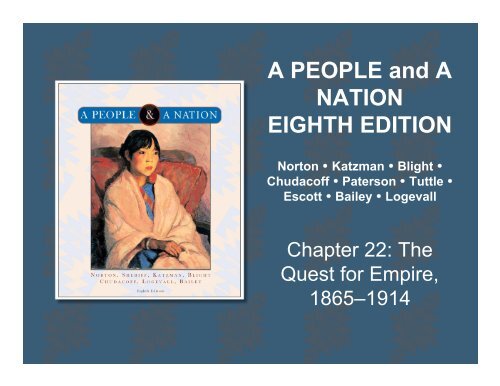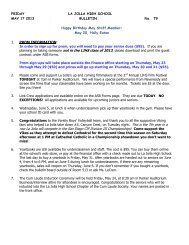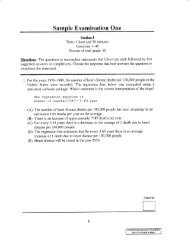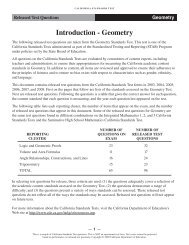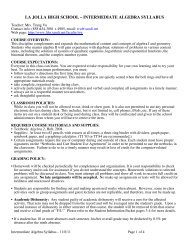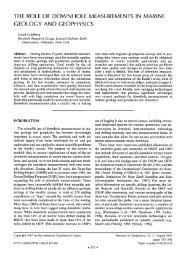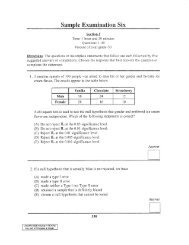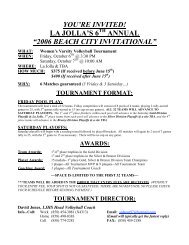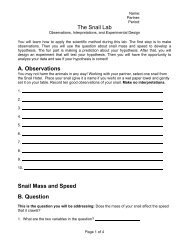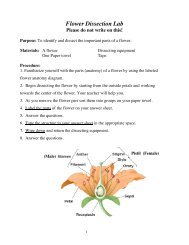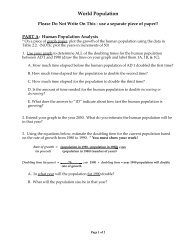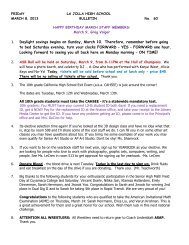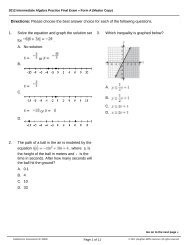Chapter 22
Chapter 22
Chapter 22
You also want an ePaper? Increase the reach of your titles
YUMPU automatically turns print PDFs into web optimized ePapers that Google loves.
A PEOPLE and A<br />
NATION<br />
EIGHTH EDITION<br />
Norton • Katzman • Blight •<br />
Chudacoff • Paterson • Tuttle •<br />
Escott • Bailey • Logevall<br />
<strong>Chapter</strong> <strong>22</strong>: The<br />
Quest for Empire,<br />
1865–1914
Ch. <strong>22</strong>: The Quest for Empire,<br />
1865–1914<br />
• Growing US interaction with world<br />
• USA expand economy, military power, &<br />
cultural influence (religion, politics)<br />
• USA build empire in Latin America &<br />
Pacific<br />
• Some Americans reject imperialism<br />
• Foreign nationalists resist US<br />
empire/ways<br />
• Change others; USA change (world<br />
power)<br />
Copyright © Houghton Mifflin Company. All rights reserved. <strong>22</strong> | 2
I. Foreign Policy Elite<br />
• Small, cosmopolitan group shape foreign<br />
policy (same people guide economy)<br />
• Argue US prosperity & security require<br />
expansion overseas & global activity<br />
• Assert foreign trade & investments = profit<br />
• Relieve farm/factory overproduction<br />
(1890s depression)<br />
Copyright © Houghton Mifflin Company. All rights reserved. <strong>22</strong> | 3
II. Foreign Trade Expansion<br />
• Key factor in post-1865 economic growth<br />
• Exports & investments abroad surge (Figure<br />
<strong>22</strong>.1)<br />
• USA achieve favorable balance of trade (1874)<br />
• Most US exports to England, Europe, Canada<br />
• Trade with Latin America & Asia also increase<br />
• Farmers & some manufacturers (Singer)<br />
depend on exports<br />
• 1913: factory exports surpass farm exports for<br />
1st time, & USA surpass other nations (Figure<br />
<strong>22</strong>.2)<br />
Copyright © Houghton Mifflin Company. All rights reserved. <strong>22</strong> | 4
III. Race Thinking & Male Ethos<br />
• Many intertwined ideas encourage empire<br />
• Exceptionalism, nationalism, capitalism,<br />
social Darwinism, & prejudice<br />
• Imperialists assert racial hierarchy with<br />
Anglo-Saxons on top<br />
• Also celebrate overseas action as “manly”<br />
• Depict foreign peoples with image of<br />
submissive female to rationalize US<br />
control<br />
Copyright © Houghton Mifflin Company. All rights reserved. <strong>22</strong> | 5
III. Race Thinking & Male Ethos<br />
(cont.)<br />
• Strong’s Our Country (1885) celebrate<br />
divine Anglo-Saxon mission to lead world<br />
• National Geographic (1888) stereotype<br />
foreign peoples as uncivilized; same with<br />
fairs<br />
• Ethnocentrism/paternalism shape<br />
imperialism<br />
• US culture superior; dark-skinned foreigners<br />
= “children”<br />
• Such ideas rationalize domination of others<br />
Copyright © Houghton Mifflin Company. All rights reserved. <strong>22</strong> | 6
IV. Immigrants to USA;<br />
US Missionaries Abroad<br />
• US racism promote restriction of<br />
immigrants<br />
• 1882: USA suspend Chinese immigration<br />
• 1907: restrict # of Japanese immigrants<br />
• Motivated by religion, 10,000<br />
missionaries (many of them women)<br />
overseas by 1915<br />
• Many racist & ethnocentric; others come<br />
to appreciate foreigners (L. Moon)<br />
• Spread US culture/power abroad<br />
Copyright © Houghton Mifflin Company. All rights reserved. <strong>22</strong> | 7
V. The “Civilizing Impulse”<br />
• Imperialists mix self-interest & idealism<br />
• Empire good for USA and for foreign<br />
peoples<br />
• USA will “uplift” natives to adopt superior<br />
US economy, culture, & politics<br />
Copyright © Houghton Mifflin Company. All rights reserved. <strong>22</strong> | 8
VI. Secretary Seward’s Quest for<br />
Empire (1861–69)<br />
• Adamant on large empire, but not by war<br />
• Trade will facilitate gravitation to USA<br />
• Domestic critics prevent purchase of<br />
Virgin Islands (1867) & Dominican<br />
Republic (1870)<br />
• Intervene in Mexico (1866)<br />
• Buy AK & lay claim to Midway Islands<br />
(1867)<br />
• Telegraph lines to Europe, Latin<br />
America, & Asia shrink globe along with<br />
steamships<br />
Copyright © Houghton Mifflin Company. All rights reserved. <strong>22</strong> | 9
VII. USA-Europe Relations;<br />
• USA negotiate as equal with Europe<br />
• England & USA settle Civil War claims<br />
(1871)<br />
• US, England, Germany compete over<br />
Samoa<br />
• Share islands (1889); then divide them<br />
(1899)<br />
Copyright © Houghton Mifflin Company. All rights reserved. <strong>22</strong> | 10
VIII. Mahan and Navalism<br />
• Major proponent of imperial/“blue water”<br />
navy to protect foreign trade<br />
• Claim navy need foreign bases to protect<br />
trade<br />
• His linkage of trade/navy/colonies shape<br />
other imperialists (T. Roosevelt, HC<br />
Lodge)<br />
• 1880s: USA build new steel & steam navy<br />
Copyright © Houghton Mifflin Company. All rights reserved. <strong>22</strong> | 11
IX. Annexation of Hawai‘i<br />
• US missionaries, businessmen, & navy<br />
see Hawai‘i as base for profit & expansion<br />
• By 1890s, white American elite dominate<br />
economy and undermine native<br />
government<br />
• 1890 tariff hurt sugar exports to USA<br />
• Elite want USA to annex Hawai‘i<br />
• Stage coup (’93) with help from US<br />
diplomats/ navy<br />
• McKinley maneuver annexation in 1898<br />
Copyright © Houghton Mifflin Company. All rights reserved. <strong>22</strong> | 12
X. Venezuelan Boundary Dispute<br />
(1895)<br />
• Quarrel with England over important<br />
border area<br />
• USA intervene<br />
• Tell England & world, because of Monroe<br />
Doctrine USA = “master” of hemisphere<br />
• Fearing competition with Germany,<br />
England retreat<br />
• USA & England settle border without<br />
consulting Venezuela (1896)<br />
Copyright © Houghton Mifflin Company. All rights reserved. <strong>22</strong> | 13
XI. Revolution in Cuba (1895)<br />
• Cubans (e.g., Marti) want freedom from<br />
Spain<br />
• Migration link Cuba & USA (baseball)<br />
• US investments dominate Cuba (sugar)<br />
• Most Cuban trade with USA, esp. FL<br />
• 1894 US tariff create economic crisis<br />
• Marti launch guerrilla war; many die &<br />
much destruction of US property, but<br />
weaken Spain<br />
• Americans sympathize with rebels<br />
Copyright © Houghton Mifflin Company. All rights reserved. <strong>22</strong> | 14
XII.McKinley’s Ultimatum and War<br />
Decision (1898)<br />
• McKinley support empire<br />
• Order Maine to Havana to show US interest in<br />
end to war<br />
• Explosion (Feb., 1898) increase pressure on<br />
McKinley to intervene further against Spain<br />
• McKinley send ultimatum<br />
• Despite concessions, choose war to oust Spain<br />
• Motives: humanitarian, secure US<br />
property/trade, opportunity for US<br />
expansion/empire<br />
Copyright © Houghton Mifflin Company. All rights reserved. <strong>22</strong> | 15
XIII. Spanish-American War<br />
• Nationalism, sensationalism, & desire to<br />
protect US interests further explain entry<br />
• Only 379 of 5462 US deaths from combat<br />
• Most die from yellow fever/typhoid in USA<br />
• 1 st US victory in Philippines via new navy<br />
• Imperialists see islands as key to US<br />
expansion in Pacific/Asia<br />
• Spain, already weak, is defeated quickly<br />
Copyright © Houghton Mifflin Company. All rights reserved. <strong>22</strong> | 16
XIV. Treaty of Paris (1898)<br />
• Cuba gain independence<br />
• Teller Amendment (in war declaration)<br />
block US annexation of Cuba<br />
• McKinley assume Cuba need US tutelage<br />
• USA get Puerto Rico, Guam, &<br />
Philippines from Spain<br />
• USA also annex Hawai’i, Wake Island,<br />
Samoa<br />
• Gain colonies/bases throughout Pacific<br />
• Senate debate treaty & empire (1899)<br />
Copyright © Houghton Mifflin Company. All rights reserved. <strong>22</strong> | 17
XV. Anti-Imperialist Arguments<br />
• For empire, both formal (annexation) &<br />
informal (economic control) methods<br />
• Some assert empire violate US principles<br />
• Fear power of president & desire for war<br />
will increase with empire<br />
• Some use racist arguments (fear<br />
nonwhite immigration); labor unions fear<br />
competition<br />
• Anti-Imperialists never form unified group<br />
(domestic issues divide them)<br />
Copyright © Houghton Mifflin Company. All rights reserved. <strong>22</strong> | 18
XVI. Imperialist Arguments<br />
• Imperialists (Beveridge) argue taking<br />
Philippines will boost US trade w/ China<br />
• Fear: if USA not take islands, then<br />
competitors (Germany, Japan) will<br />
• Assert empire part of America’s “white<br />
man’s burden” (Kipling)<br />
• Imperialists win in Senate (1899)<br />
• McKinley praise empire in 1900 reelection<br />
Copyright © Houghton Mifflin Company. All rights reserved. <strong>22</strong> | 19
XVII. Philippine Insurrection and<br />
Pacification<br />
• Nationalists (Aguinaldo) feel betrayed by<br />
Treaty and continue fight for independence<br />
• Vicious war develop; USA crush most<br />
resistance by 1902, but war continue in south<br />
• Combat deaths: > 4000 Americans & 20,000<br />
Filipinos (+600,000 from starvation/disease)<br />
• Control Philippines via education, censorship,<br />
economic links<br />
• Also promise (1916) eventual independence<br />
Copyright © Houghton Mifflin Company. All rights reserved. <strong>22</strong> | 20
XVIII. China & the Open Door Policy<br />
• Imperialist powers (Europe/Japan) carve<br />
weak China into “spheres of influence”<br />
• US missionaries & businessmen fear<br />
being shut out of China; lobby US Gov’t<br />
• USA lack power to make Europe/Japan<br />
stop<br />
• McKinley & Secretary Hay decide to<br />
proclaim US policy goals in China<br />
• 1899 note call for equal trade opportunity<br />
Copyright © Houghton Mifflin Company. All rights reserved. <strong>22</strong> | 21
XVIII. China & the Open<br />
Door Policy (cont.)<br />
• US participate (1900) in suppressing<br />
China’s Boxer Rebellion against foreigners<br />
• Second note (1900) call for preserving<br />
China’s territorial integrity<br />
• Open Door notes settle little at time<br />
• Become key tenets of US policy in Asia &<br />
elsewhere to help US expand economically<br />
• Assume US economy must have foreign<br />
trade<br />
Copyright © Houghton Mifflin Company. All rights reserved. <strong>22</strong> | <strong>22</strong>
XIX. TR’s World<br />
• Adamant imperialist<br />
• Relish power & violence<br />
• Racist & ethnocentric<br />
• Realize limits to US power<br />
• Centralize policy-making in White House<br />
Copyright © Houghton Mifflin Company. All rights reserved. <strong>22</strong> | 23
XX. Latin America<br />
• USA = dominate economic/military power<br />
• Enable USA or US corporations (United<br />
Fruit) to manipulate governments<br />
• USA dominate Cuba with Platt<br />
Amendment, 1903<br />
• Control Cuban foreign policy<br />
• Authorize US military intervention<br />
• Puerto Ricans debate response to US<br />
control and racism<br />
Copyright © Houghton Mifflin Company. All rights reserved. <strong>22</strong> | 24
XX. Latin America (cont.)<br />
• TR foment revolution in Panama<br />
• Create dependent nation with US control of<br />
canal<br />
• Canal (1914) expand US economy/power<br />
• Roosevelt Corollary (1904) proclaim “police<br />
power”<br />
• Map <strong>22</strong>.2: frequent US military interventions<br />
and political control<br />
• Mexican Revolution (1910) reflect<br />
resistance to US economic domination;<br />
Wilson send troops<br />
Copyright © Houghton Mifflin Company. All rights reserved. <strong>22</strong> | 25
XXI. Peacemaking in East Asia<br />
• Japan emerge as major Asian power/rival<br />
• To protect possessions & Open Door,<br />
USA accommodate Japan & expand navy<br />
• Taft-Katsura (1905): USA accept Japan<br />
in Korea in exchange for USA in<br />
Philippines<br />
• Root-Takahira (1908): USA accept Japan<br />
in Manchuria for endorsement of Open<br />
Door<br />
• Roosevelt send “Great White Fleet”<br />
(1907)<br />
Copyright © Houghton Mifflin Company. All rights reserved. <strong>22</strong> | 26
XXI. Peacemaking in East Asia<br />
(con’t)<br />
• Taft try Dollar Diplomacy to restrain<br />
Japan<br />
• US corporations loan money for Chinese<br />
railways<br />
• Japan issue 21 Demands (1915) to<br />
dominate China<br />
• USA protest, but lack power to block<br />
Japan completely<br />
Copyright © Houghton Mifflin Company. All rights reserved. <strong>22</strong> | 27
XXII. Anglo-American<br />
Rapprochement<br />
• In response to US actions in Latin<br />
America, Europeans accept US<br />
hegemony there<br />
• USA try to preserve its traditional noninvolvement<br />
in European conflicts<br />
• Anglo-American rapprochement develop<br />
• Trade links increase; both fear Germany<br />
• Like other peoples, British debate<br />
response to expansion of US culture<br />
around globe<br />
Copyright © Houghton Mifflin Company. All rights reserved. <strong>22</strong> | 28
Summary: Discuss Links to the<br />
World & Legacy<br />
• National Geographic (1888) as new link w/ world?<br />
• Increase knowledge of global geography, but how did<br />
magazine rely heavily on certain types of photos while<br />
avoiding controversial issues?<br />
• US base @ Guantanamo Bay as legacy of US foreign<br />
activity, early 1900s?<br />
• Source of continuing tension with Cuba?<br />
• “Gitmo” & current debate over treatment of large<br />
numbers of “unlawful enemy combatants?”<br />
Copyright © Houghton Mifflin Company. All rights reserved. <strong>22</strong> | 29


